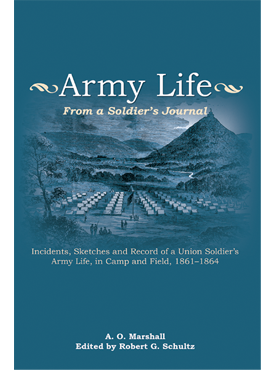In 1884, when Albert O. Marshall published Army Life, a memoir of his service as a private in the Thirty-Third Illinois Regiment, twenty years had passed since his 1864 discharge. Marshall left the journal untouched at publication, and today it is a journal that is rare in what it is not. This memoir is not a complete story of the Thirty-Third (known as the “Normal Regiment” because many of its soldiers were from Illinois State Normal University), nor is it a complete roster of regiment members, nor a list of killed and wounded.
Army Life is not, even, a purely military account written from an officer’s point of view. It is the story of a twenty-year-old private whose engaging writing belies his age but also allows his youth to shine through. Marshall tells of the battles he fought and the games he played, of his friends, fellow soldiers, and officers, and of the regiment’s activities in Missouri and Arkansas, at Vicksburg, and in Louisiana and on the Texas Gulf Coast. Enhanced with careful editing and thorough annotations, this journal Marshall carried faithfully to every mustering out is a rich and important Civil War memoir.
Albert O. Marshall was born in 1840 on a farm in Illinois. He served in the Thirty-Third Illinois Regiment for three years, after which he became a lawyer and was elected to a four-year term in the state senate and later to the county court as a circuit court judge.
Robert G. Schultz teaches at East Central College in Union, Missouri, and has published numerous articles on local and regional history and postal history.
“The Civil War in the West has a single goal: to promote historical writing about the war in the western states and territories. It focuses most particularly on the Trans-Mississippi theater, which consisted of Missouri, Arkansas, Texas, most of Louisiana (west of the Mississippi River), Indian Territory (modern day Oklahoma), and Arizona Territory (two-fifths of modern day Arizona and New Mexico) but encompasses adjacent states, such as Kansas, Tennessee, and Mississippi, that directly influenced the Trans-Mississippi war. It is a wide swath, to be sure, but one too often ignored by historians and, consequently, too little understood and appreciated.
Topically, the series embraces all aspects of the wartime story. Military history in its many guises, from the strategies of generals to the daily lives of common soldiers, forms an important part of that story, but so, too, do the numerous and complex political, economic, social, and diplomatic dimensions of the war. The series also provides a variety of perspectives on these topics. Most importantly, it offers the best in modern scholarship, with thoughtful, challenging monographs.
Secondly, it presents new editions of important books that have gone out of print. And thirdly, it premieres expertly edited correspondence, diaries, reminiscences, and other writings by participants in the war.
It is a formidable challenge, but by focusing on some of the least familiar dimensions of the conflict, The Civil War in the West significantly broadens our understanding of the nation’s most pivotal and dramatic story.”
—Daniel Sutherland, from the preface of I Do Wish This Cruel War Was Over

